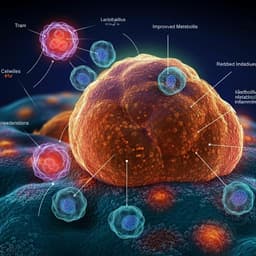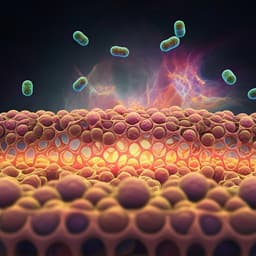
Medicine and Health
Galactooligosaccharides and *Limosilactobacillus reuteri* synergistically alleviate gut inflammation and barrier dysfunction by enriching *Bacteroides acidifaciens* for pentadecanoic acid biosynthesis
Y. Wu, X. Zhang, et al.
Ulcerative colitis (UC), a major form of inflammatory bowel disease, is closely associated with intestinal inflammation, epithelial barrier dysfunction, and gut dysbiosis. Current preventive and therapeutic options remain limited. Dietary strategies using prebiotics, probiotics, and synbiotics can modulate the intestinal microbiota, immune responses, and barrier function, but the underlying protective mechanisms remain incompletely defined. Galactooligosaccharides (GOS) and Limosilactobacillus reuteri are established prebiotic and probiotic, respectively; prior work shows that GOS can enhance intestinal barrier function and promote colonization of specific lactobacilli, including L. reuteri, and that L. reuteri can utilize GOS as a carbon source. However, it is unknown whether GOS and L. reuteri act synergistically to alleviate inflammation and improve barrier integrity, and which intestinal bacteria and metabolites mediate these effects. This study aims to determine whether a GOS–L. reuteri synbiotic mitigates DSS-induced colitis, to identify the key microbial taxa and metabolites involved, and to elucidate mechanisms linking synbiotic-modulated microbiota to barrier protection and anti-inflammatory activity.
Prior studies link UC pathogenesis to immune dysregulation, dysbiosis, and impaired intestinal barrier function. Synbiotics (prebiotic–probiotic combinations) can beneficially alter the microbiota and host responses. GOS is a prebiotic that supports beneficial taxa and improves barrier function; L. reuteri can metabolize GOS and has reported health benefits. Bacteroides acidifaciens has been implicated in host metabolic and immune benefits and improved mucosal defenses. Altered intestinal long-chain fatty acid metabolism is noted in UC, with evidence that odd-chain fatty acids like pentadecanoic acid (C15:0) possess anti-inflammatory actions via pathways including AMPK and PPAR activation and inhibition of mTOR/JAK-STAT/HDAC6.
Ethics: Human cohort approved by Jiangyin People’s Hospital Ethics Committee (2023-043) with informed consent; animal studies approved by China Agricultural University IACUC (Aw60213202-1-1). Human cohort: 15 healthy donors and 11 UC patients (2023, Jiangsu, China), ages 25–70, antibiotic-free ≥2 weeks before sampling. Fecal B. acidifaciens quantified by RT-qPCR; fecal C15:0 measured by targeted metabolomics. Public metabolomics datasets (n=503 controls, n=649 UC) reanalyzed for C15:0 in feces, serum, and colonic biopsies; activity stratification (inactive n=408, active n=167). Mouse DSS colitis model: Male C57BL/6J mice (6–8 weeks) in SPF conditions. DSS 3% in drinking water for 1 week to induce colitis. Synbiotic interventions: GOS supplementation at 5% (w/w) in chow. In Fig. 1 experiment, mice (n=6/group) received GOS for 5 weeks with/without daily oral L. reuteri (2×10^7 CFU), followed by DSS in the final week. Additional experiments used GOS 4 weeks with L. reuteri 2×10^8 CFU/day (BNCC 186135) or two mouse-isolated strains (#1, #2; 2×10^7 CFU/day). Outcomes: body weight change, colon length, histology (H&E, Alcian blue), histological damage score, goblet cell counts, tight junction proteins (Claudin-1, Occludin, ZO-1) by western blot, serum cytokines (TNF-α, IL-1β, IL-6). FMT and FST: Microbiota depletion via antibiotic cocktail (streptomycin 1 g/L, ampicillin 0.5 g/L, vancomycin 0.5 g/L, gentamicin 1 g/L) for 4 weeks. FMT: daily gavage (0.2 mL) for 2 weeks with fecal suspensions from control chow-fed (CONFMT) or GOS+L. reuteri-fed donors (GLFMT); n=8/group; DSS in last week. FST: daily gavage (0.2 mL) for 2 weeks of bacterial cell-free fecal supernatants from controls (CONFST) or synbiotic-fed (GLFST); n=6/group; DSS second week. Fecal supernatants prepared by centrifugation and 0.22 µm filtration. Post-treatment assessments as above. Bacterial administration: B. acidifaciens BNCC 353574 or JCM10556 administered by oral gavage (2×10^8 CFU in 0.2 mL PBS) daily for 3 weeks; DSS 3% provided in week 3; n=6/group. Outcomes as above. C15:0 intervention: Pentadecanoic acid at 35 mg/kg/day by oral gavage in 0.2 mL PBS for 3 weeks; DSS in final week; n=6/group. In vitro: MODE-K and Caco-2 cells treated with LPS (10 µg/mL) ± C15:0 (50 µM) ± FATP4 inhibitor dihydropyrimidinone (DHPM) 1 µM for 24 h. Microbiome analyses: 16S rRNA V3–V4 sequencing (Illumina MiSeq), taxonomic assignment with SILVA138; PCoA (UniFrac); differential taxa via Kruskal–Wallis with Dunn’s; targeted RT-qPCR for specific species (standard curves, copy number ratios). Shotgun metagenomics (Illumina NovaSeq): Fastp filtering, MEGAHIT assembly, MetaGene prediction, CD-HIT non-redundant catalog, SOAPaligner abundance, DIAMOND NR annotation; random forest for discriminatory taxa; assessment of fatty acid biosynthesis genes (e.g., fabK, acrC, fabF, FATA) and their abundance changes. Metabolomics: Targeted profiling using Q300 Metabolite Array (UPLC–MS/MS) with 306 internal standards across >11 metabolite classes. Fecal samples (5 mg) extracted and derivatized; quantitation via TMBQ software; statistics via iMAP with Wilcoxon, adjusted P<0.05; Z-score heatmaps and volcano plots. Bacterial culture and C15:0 biosynthesis in vitro: Anaerobic culture of L. reuteri (MRS) and B. acidifaciens (BHI) at 37°C. C15:0 biosynthesis medium with defined components; additions included GOS (1% w/v), L. reuteri (10^8 CFU/mL; 1% v/v), or GL-derived fecal supernatant (1% v/v). C15:0 measured in culture supernatants. Cecal microbiota cultivation: Mouse cecal contents cultured anaerobically in modified PYG; supplements tested: GOS (1 mM), L. reuteri (10^8 CFU/mL), N-acetyl-D-glucosamine (1 mM), β-alanine (1 mM), 4-methylhexanoic acid (1 mM), myristic acid (1 mM). B. acidifaciens relative abundance quantified by RT-qPCR. Host transcriptomics and protein assays: RNA-seq (HiSeq X Ten), alignment to Mus musculus GRCm39, DESeq2 (|log2FC|>1, q<0.05), KEGG enrichment (Goatools, KOBAS). Western blot for Claudin-1, Occludin, ZO-1, NF-κB p65, phospho-p65, FATP4; quantification via ImageJ. Pig LPS inflammation model: Weaned male piglets (n=12) received intraperitoneal LPS (100 µg/kg) or saline; fecal B. acidifaciens and C15:0 measured. Statistics: Normality via Shapiro–Wilk; Student’s t test or one-way ANOVA with Tukey’s for parametric data; Mann–Whitney U or Kruskal–Wallis with Dunn’s for non-parametric; Spearman correlations; data as mean ± SEM.
- The GOS + L. reuteri synbiotic, but not either alone, significantly mitigated DSS-induced colitis in mice: reduced body weight loss, preserved colon length, improved mucosal integrity, lowered histological damage scores, restored tight junction proteins (Claudin-1, Occludin, ZO-1), and decreased serum pro-inflammatory cytokines (TNF-α, IL-1β, IL-6) (multiple comparisons with p<0.05 to p<0.001 across measures; n=6/group).
- Synbiotic altered gut microbiota composition, notably restoring the genus Bacteroides in DSS-treated mice and specifically enriching Bacteroides acidifaciens (validated by shotgun metagenomics and ranked as the top discriminating species via random forest). Single GOS or L. reuteri did not enrich B. acidifaciens.
- Strain specificity: Among two additional L. reuteri isolates, strain #1 reproduced protective effects and enriched B. acidifaciens, whereas strain #2 did not.
- FMT from synbiotic-supplemented donors transferred protection to microbiota-depleted recipients (improved clinical and barrier metrics and lowered cytokines) and increased B. acidifaciens abundance; FST (cell-free fecal supernatant) also conferred protection, implicating metabolites.
- Metabolomics identified pentadecanoic acid (C15:0) as the most significantly downregulated metabolite by DSS and upregulated by synbiotic (lowest adjusted p-value). Fecal C15:0 increased following synbiotic, FMT/FST, and B. acidifaciens administration.
- Synbiotic-derived metabolite N-acetyl-D-glucosamine selectively promoted B. acidifaciens growth in cecal microbiota culture, approaching the synbiotic’s enrichment efficacy.
- B. acidifaciens administration alone protected against DSS colitis: improved weight, colon length, histology, restored tight junction proteins, and reduced pro-inflammatory cytokines (n=6/group).
- B. acidifaciens synthesizes C15:0: in vitro cultures showed elevated C15:0, augmented by co-culture with GOS and L. reuteri. Whole-genome analysis identified a complete set of fatty acid biosynthesis genes; metagenomics showed DSS-downregulated C15:0 pathway genes (fabK, acrC, fabF, FATA) were restored by the synbiotic. C15:0 levels positively correlated with B. acidifaciens abundance in multiple experiments.
- C15:0 gavage (35 mg/kg/day) protected against DSS colitis and reversed LPS-induced inflammation in MODE-K and Caco-2 cells: restored tight junction proteins, reduced pro-inflammatory cytokine expression, and suppressed NF-κB p65 phosphorylation.
- Mechanism: C15:0 upregulated FATP4 (Slc27a4); inhibition of FATP4 abrogated C15:0-mediated restoration of tight junctions and cytokine suppression, indicating a FATP4-dependent mechanism leading to NF-κB inhibition.
- Translational relevance: UC patients (n=11) versus healthy controls (n=15) showed significantly reduced fecal B. acidifaciens and C15:0, with positive correlations between them. LPS-challenged piglets similarly exhibited reduced B. acidifaciens and C15:0 with a strong positive association. Reanalysis of large external datasets (n=1152 total) showed lower C15:0 in feces, serum, and colonic biopsies of UC vs controls, and further reductions in active vs inactive UC.
The study addresses whether a GOS–L. reuteri synbiotic exerts synergistic benefits on colitis and elucidates the underlying microbiota–metabolite–host mechanisms. Findings demonstrate that the synbiotic enriches B. acidifaciens and enhances biosynthesis of the odd-chain fatty acid C15:0, which in turn restores intestinal barrier integrity and dampens inflammatory responses. The protective effects are transferable via FMT and FST, underscoring a metabolite-mediated component. B. acidifaciens alone is sufficient to confer protection and to increase fecal C15:0, and C15:0 itself recapitulates anti-inflammatory and barrier-protective effects in vivo and in vitro. Mechanistically, C15:0 upregulates the fatty acid transporter/enzyme FATP4 and suppresses NF-κB activation, providing a plausible pathway for mitigating mucosal inflammation and reinforcing tight junctions. The observed reductions of B. acidifaciens and C15:0 across DSS mice, UC patients, and LPS-challenged piglets highlight a conserved association between intestinal inflammation, commensal Bacteroides acidifaciens depletion, and diminished C15:0. These results suggest that synbiotic strategies targeting specific commensals and their metabolites can correct dysbiosis, improve barrier function, and curb mucosal inflammation, offering potential complementary therapies for UC.
A synbiotic combining GOS and Limosilactobacillus reuteri synergistically alleviates DSS-induced intestinal inflammation and barrier dysfunction by enriching Bacteroides acidifaciens and promoting pentadecanoic acid (C15:0) biosynthesis. B. acidifaciens and C15:0 independently protect against colitis, with C15:0 acting via FATP4 to suppress NF-κB activation and enhance tight junction integrity. Human UC and a porcine inflammation model similarly display reduced B. acidifaciens and C15:0, supporting translational relevance. These findings establish a mechanistic link between synbiotic-driven microbiota modulation and metabolite-mediated host protection, suggesting therapeutic potential for synbiotics, B. acidifaciens, and C15:0 in UC and related intestinal inflammatory disorders. Future work should optimize strain selection and dosing, explore formulation (e.g., microencapsulation), and conduct larger and longitudinal clinical trials to evaluate efficacy and safety.
- Effect size of synbiotic/B. acidifaciens/C15:0 (approximately 25–30% reduction in histological damage) is smaller than standard UC pharmacotherapies; optimization may be needed.
- Strain-specific variability: not all L. reuteri strains enriched B. acidifaciens or conferred protection; broader screening required.
- Synbiotic altered microbiota without fully restoring it to a healthy baseline, indicating partial ecological correction.
- Predominantly preclinical models (mouse DSS colitis, pig LPS challenge); human data are cross-sectional with a relatively small single-center UC cohort (n=11 UC, n=15 controls) for validation of associations, without interventional trials.
- Mechanistic focus on FATP4–NF-κB does not exclude additional pathways through which C15:0 may act.
Related Publications
Explore these studies to deepen your understanding of the subject.







